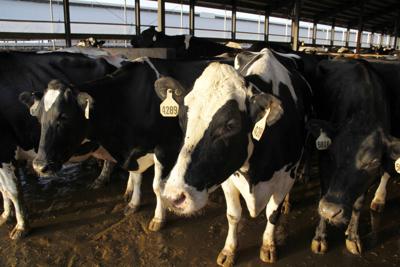A northeast Wisconsin judge Tuesday ruled in favor of maintaining a requirement meant to prevent water pollution from large-scale commercial farms, a decision cheered by environmental advocates.
In an oral ruling, Calumet County District Court Judge Carey Reed sided with the state Department of Natural Resources in their bid to dismiss the case, brought by the litigation arm of Wisconsin Manufacturers and Commerce on behalf of two dairy groups last year.
The case centered on a state regulation requiring large farms known as controlled animal feeding operations, or CAFOs, to pre-emptively obtain a wastewater discharge permit before any pollution occurred.
It is a core part of regulating the rising number of CAFOs in the state, with DNR data showing 336 such operations in Wisconsin. A farm is deemed a CAFO if it has over 1,000 animal units, or over 715 dairy cows or over 1,000 head of cattle.
Wisconsin Manufacturers and Commerce, the statewide chamber of commerce, argued on behalf of the Wisconsin Dairy Alliance and Venture Dairy Cooperative, a Loyal farm, that federal court rulings have shown that CAFOs cannot be required to obtain those types of permits without actually having released animal waste into an area waterway.
Environmentalists argued the requirement is an important mechanism for keeping waste from leaking into waterways and potentially contaminating a community’s drinking water.
As part of the process, the farms must also show to the DNR how they plan to control animal waste and how a possible spill would be handled. The DNR also can limit herd sizes.
Removing that regulation would be “catastrophic for water protection in our state,” said Evan Feinauer, an attorney for the environmental group Clean Wisconsin, in a statement.
“This ruling is critical because it preserves the DNR's ability to address water pollution that can be caused by these facilities, at a time when many surface and groundwaters around the state are contaminated with animal waste," Feinauer said.
Fights over the DNR's power to regulate the large farms are not new.
In 2021, the Wisconsin Supreme Court ruled that the DNR could require stricter regulations on CAFOs when it comes to more closely monitoring for groundwater pollution and limiting the number of animals that can be housed.
A spokesperson for Wisconsin Manufacturers and Commerce, or WMC, declined comment.
WMC has also backed a series of lawsuits challenging the DNR’s authority to force PFAS remediation, a broader water quality issue affecting residents where the toxic chemicals have found their way into ground or surface water.
A Waukesha County judge ruled last year that the DNR couldn’t force the cleanup of PFAS because the chemicals aren't formally listed as a hazardous substance. The ruling was ultimately put on pause by the judge, as an appeal is ongoing.






